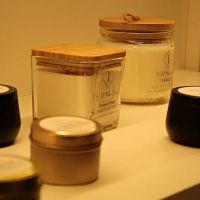Can Scented Candles Cause Respiratory Problems? Insights and Safer Alternatives
- 1. How Scented Candles Impact Air Quality
- 2. Health Concerns Related to Scented Candles
- 3. Real-Life Stories About Scented Candle Use
- 4. Choosing Safer Alternatives to Scented Candles
- 5. Shop for Safer Fragrance Options at Scent Snob
1. How Scented Candles Impact Air Quality
Scented candles are often chosen for their ability to create a cozy and fragrant atmosphere. However, many don’t realize that certain candles may release harmful compounds into the air when burned. Paraffin wax candles, for example, can emit volatile organic compounds (VOCs) like toluene and benzene, which are known irritants and potential carcinogens.
The added fragrances in candles, especially those made with synthetic chemicals, may also release particles that linger in the air, potentially impacting indoor air quality. If your home is not well-ventilated, these compounds can build up and contribute to respiratory issues over time.
2. Health Concerns Related to Scented Candles
While most people enjoy scented candles without adverse effects, those with respiratory conditions like asthma, allergies, or chronic bronchitis may experience heightened sensitivity. Here are some common concerns:
- Triggering Asthma Attacks: Strong fragrances and smoke from candles can irritate airways, potentially leading to asthma attacks or increased difficulty breathing.
- Allergic Reactions: Synthetic fragrances may contain allergens that can cause sneezing, coughing, or watery eyes in sensitive individuals.
- Headaches and Nausea: The chemicals in low-quality scented candles may trigger headaches or nausea, particularly in poorly ventilated spaces.
- Long-Term Effects: Prolonged exposure to VOCs from certain candles could have cumulative effects on respiratory health.
To minimize these risks, it’s essential to understand the materials and fragrances used in your candles and to choose safer alternatives when necessary.
id="real-life-stories-on-candle-use">3. Real-Life Stories About Scented Candle Use
A viral story on social media highlighted how one family experienced ongoing respiratory issues, including persistent coughing and throat irritation, after frequently burning low-quality scented candles in their home. After switching to natural, plant-based candles and improving ventilation, their symptoms gradually subsided.
Similarly, a study published in a medical journal documented how synthetic fragrance exposure from candles exacerbated asthma symptoms in patients. These cases emphasize the importance of being mindful about the types of candles used and their potential impact on health.
4. Choosing Safer Alternatives to Scented Candles
If you love using scented candles but are concerned about their impact on respiratory health, consider these safer alternatives:
- Opt for Soy or Beeswax Candles: These candles are made from natural, non-toxic ingredients and emit fewer pollutants than paraffin candles.
- Use Essential Oil Diffusers: Diffusers allow you to enjoy pleasant scents without the need for burning, reducing the risk of airborne irritants.
- Choose Unscented or Lightly Scented Options: Unscented candles or those with natural essential oil fragrances are less likely to cause irritation.
- Improve Ventilation: Ensure your space is well-ventilated when burning candles to minimize the accumulation of VOCs and other particles.
By choosing these alternatives, you can enjoy the ambiance of scented candles while safeguarding your health and the air quality in your home.
5. Shop for Safer Fragrance Options at Scent Snob
Looking for high-quality, natural alternatives to traditional scented candles? Visit Scent Snob to explore a curated collection of soy and beeswax candles infused with essential oils. Our products are designed to provide a clean burn, delightful aromas, and a healthier experience for your home.
Whether you’re searching for a relaxing lavender candle or an uplifting citrus scent, you’ll find something to suit your taste and lifestyle. Shop now and discover safer ways to enjoy your favorite fragrances!



0 comments